Australian kids ‘see betting as part of sport’
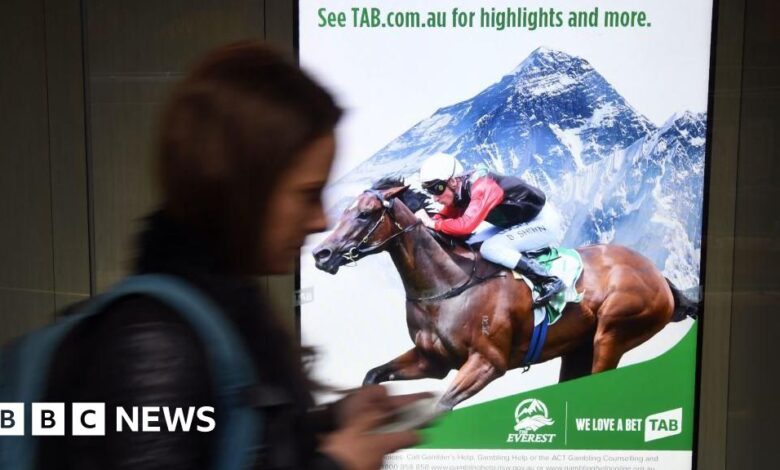
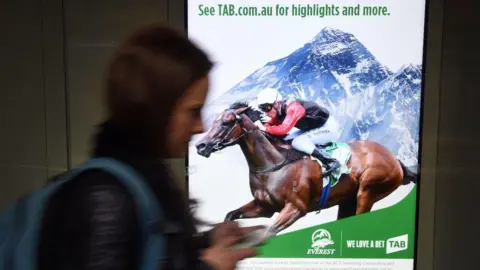 Getty Images
Getty ImagesLike many others in Australia, Sam grew up in a community where betting was synonymous with sport.
“Our friends and family would ask, ‘Oh who are you betting on this week?’ It was a normal conversation that happened,” said his sister, Amy — who does not use her real name.
Looking back, she blames the normalization of gambling — the way it crept into their home and became ingrained in social interactions — for her brother’s addiction, and for the suffering he endured before his suicide.
“It destroyed him physically and mentally,” she explained. “We tried everything. We’re a close-knit family, but obviously we didn’t know how bad it was — it crushed him.”
Amy is one of dozens of people testifying at a bipartisan parliamentary inquiry into the impact of gambling in Australia – a country with more gambling per capita than any other.
The inquiry found there were “few safeguards” to protect those struggling with addiction and recommended 31 reforms to avoid “enticement” to a new generation of children into gambling, starting with a phased three-year ban on advertising.
Now Prime Minister Anthony Albanese is under growing pressure – both from outside and within his party – to act, with polls showing a majority of people backing the move.
But the government has signalled it may instead opt for a cap on advertising, citing the role of gambling advertising revenue in supporting the country’s struggling free-to-air broadcasters, as well as warnings from betting companies that a ban could drive consumers abroad.
Doing so would result in huge tax losses for Australian betting platforms that currently fund “vital services”, the peak body representing the industry said.
The debate has sparked accusations that corporate interests are blocking sensible reform.
It also highlights the deep connection between sport, gambling and entertainment in Australia.
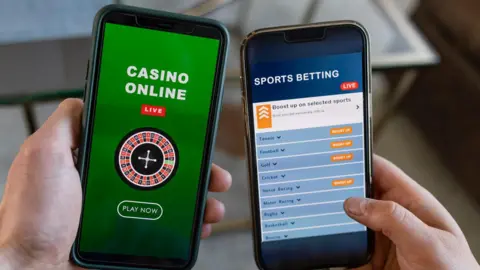 Getty Images
Getty ImagesA betting boom
Betting occupies a special place in Australian culture.
In the 1980s, it became the first country to deregulate the gambling industry, allowing slot machines – previously only allowed in casinos – to expand into licensed pubs and clubs.
Today, Australia is home to about 0.33% of the world’s population, but accounts for a fifth of all “poker machines” – the colloquial term used to refer to these machines.
The past two decades have also seen an explosion in the popularity of online betting, particularly when it comes to sports. Estimates suggest Australians are spending around A$25bn ($16.8bn; £12.9bn) on legal bets each year – with 38% of the population gambling weekly.
Experts say sophisticated marketing has fueled that boom, while sponsorship deals, partnerships and commissions with popular sports organizations have helped legitimize the industry.
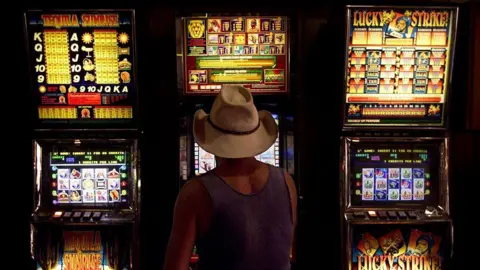 Getty Images
Getty ImagesSean – not his real name – has been gambling legally, and often obsessively, for more than 18 years. He was introduced to sports betting by a friend as a teenager, and from there it just grew. “There were days when I couldn’t sleep unless I knew I had a bet. It got to the point where I was betting on sports I’d never seen in countries I’d never heard of,” he told the BBC.
Now 36 and seeking help from sponsors, he is reluctant to keep track of what appears to be a lifetime loss, but he estimates the total at around A$2 million.
He said the breakdown of relationships and years of isolation were hard to quantify: “If I had never gambled, I would be married with children by now.”
An academic article found that like Sean, 90% of Australian adults and around three-quarters of children aged 8 to 16 consider betting to be “a normal part of sport”. Advocates such as Martin Thomas say this is evidence that the activity “has permeated every corner of society”.
“Our children know as much about the odds of a match and bet as they do about their favourite players,” he told the BBC.
In Amy’s view, in addition to making it harder for people of all ages to quit gambling, that normalization also creates a dangerous hidden meaning: that any negative effects — such as debt or addiction — are the fault of the individual, not the system.
“When you go to a sporting event and it’s full of betting ads, you think, ‘Oh, I’m the problem. Because everyone else is doing it,’ you know what I mean?
“That’s what my brother thinks.”
Like many other advocates, she wants to see gambling reframed as a major public health issue rather than a recreational activity, as surveys have shown that nearly half of those who engage in the activity are at risk of or have experienced harms associated with it – such as financial hardship, domestic violence, depression and suicide.
Research suggests an advertising ban could be a first step towards that goal. And advocates say there is a well-trodden path that governments could follow. Mr Thomas cites Australia’s decision to ban tobacco advertising in 1992 – which is credited with significantly reducing smoking rates – as evidence of what is possible.
But while Prime Minister Anthony Albanese described the “saturation of gambling advertising” as “unacceptable”, he has yet to commit to any specific action.
Instead, he pointed to other government initiatives when questioned – such as banning the use of credit cards for online betting and creating a register for people to remove themselves from betting sites. He also sometimes referred to gambling as a long-standing problem.
“[This] “I think it’s been a problem in our society since men and women learned to walk, and betting on who could ride a horse the fastest or who could run from one rock to another, probably before there were buildings,” he told parliament on Wednesday.
‘The house always wins’
The peak body representing Australia’s betting companies has described a blanket ban as “a step too far” and backed the government’s proposed cap – which would restrict advertising online and in television programming in general.
“This way, community expectations of seeing less advertising will be met, while still maintaining vital support for sporting codes and local broadcasters,” Responsible Wagering Australia CEO Kai Cantwell said in a statement.
But Dr Andrew Hughes, a lecturer in marketing at the Australian National University, has cast doubt on the significance of that financial support – with Nielsen data showing the bulk of the advertising money the national broadcasters earn comes from a variety of sectors, not betting platforms.
And independent senators, like David Pocock, have criticised the logic of using money from betting to prop up the media.
“Journalism is incredibly important, but it shouldn’t be dependent on products that we know are harmful, causing addiction, personal problems, family breakdown and in some cases suicide,” he told the BBC.
“The government should have the imagination to find other ways to bridge that gap.”
Mr Pocock is one of several senators who have publicly questioned whether betting companies and the industries they fund interfere in policy decisions – citing their extensive lobbying efforts and history of making large political donations.
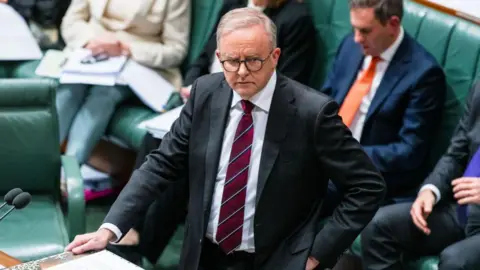 Getty Images
Getty ImagesLast week, he joined 20 MPs from across the political spectrum in signing an open letter supporting the advertising ban, calling for a free vote on the issue so MPs in Mr Albanese’s party could debate it without any repercussions.
Several health bodies have also expressed support for the ban, as has a government-appointed expert panel investigating how to reduce the rate of domestic violence in Australia – adding to the pressure Mr Albanese is facing.
The government has put warnings on gambling advertisements to remind people of the risks.
But Sean says that doesn’t stop people from spiraling into addiction.
“I knew the house always won, but every time I was ready to bet, everything went down the drain,” he explained. “I started thinking that I was going to get that one win, the one that would take me away from everything. That win would get me back.”
While no final decision has been made and Mr Albanese’s cabinet is still weighing up options, for Amy the debate itself has become too “emotionless” to watch.
She didn’t understand why this was happening and wanted answers.
“Anyone who understands this issue would absolutely agree to ban the advertising altogether – that’s what the evidence shows,” she told the BBC. “It feels like these lobbyists own the government… We’re dangling this dangerous product in front of people and normalising it, and the worst case scenario is what happened to us.
“My family – they will never recover. It’s not something you can recover from.”





